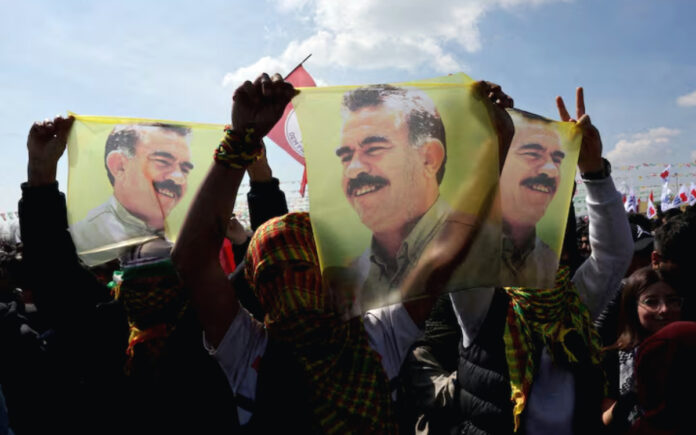Ankara: Abdullah Ocalan, the Kurdish militant leader imprisoned 25 years ago, is once again in the spotlight following a proposal by a key ally of President Tayyip Erdogan. Nationalist Movement Party (MHP) leader Devlet Bahceli recently suggested that Ocalan’s release could be considered in exchange for ending the PKK’s ongoing insurgency against the Turkish state. This unexpected remark came during a speech on Tuesday, following speculation about renewed efforts to address the conflict Ocalan started over 40 years ago.
It remains uncertain whether a deadly attack on the Turkish Aerospace Industries headquarters in Ankara on Wednesday, which killed five people and injured 22, will impact Bahceli’s overture. The Turkish government has blamed Ocalan’s Kurdistan Workers’ Party (PKK) for the assault, in which the two attackers were also killed.
The PKK began its armed struggle in 1984, seeking to establish an ethnic Kurdish homeland in southeastern Turkey. The conflict, which has spanned four decades, has resulted in tens of thousands of deaths, profoundly affecting Turkish politics and devastating towns across the southeast.
Ocalan has been imprisoned since 1999 after being captured by Turkish special forces in Kenya. He has spent the last 25 years incarcerated on Imrali Island, south of Istanbul. Despite his confinement, Ocalan continued to exert significant influence for many years, though it is unclear how much control he still holds over the PKK, whose fighters are primarily based in northern Iraq’s mountainous regions.
At 75, Ocalan might be open to the MHP’s proposal to end the insurgency, though this would not mark the first time he has engaged in negotiations with the Turkish government.
A Struggle “Filled with Pain”
Ocalan is both reviled by the majority of Turks and revered by Kurdish nationalists, who affectionately call him “Apo.” His prominence grew during the 2013-2015 peace talks between the Turkish state and PKK fighters. At the time, then-Prime Minister Erdogan viewed Ocalan as pivotal in efforts to end the violence, which has claimed over 40,000 lives—many of them Kurdish militants.
From prison, Ocalan remained a central figure in the peace process. Turkish media often depicted him as a more benign figure, contrasting earlier images of him in military attire with a rifle.
“This struggle of our 40-year-old movement, which has been filled with pain, has not gone to waste but at the same time has become unsustainable,” Ocalan declared in a statement read to crowds at Kurdish New Year celebrations in March 2015.
That peace process marked the closest Ocalan came to negotiating an end to the conflict. However, just four months later, the talks collapsed, and the fighting intensified, particularly in urban southeastern areas, shifting away from the rural battles of the past. Today, the conflict mainly rages in northern Iraq.
Ocalan’s nephew revealed that he visited his uncle on Wednesday for the first time in four years. Omer Ocalan shared a statement from his uncle on social media platform X, quoting him as saying, “If the conditions are right, I have the theoretical and practical power to move this process from a foundation of conflict and violence to legal and political ground.”
Also Read | Thai PM Apologizes for 2004 Tak Bai Massacre as Justice Remains Elusive
The Making of a Militant Leader
Born to a peasant family in the village of Omerli in southeastern Turkey, Ocalan’s political views were shaped by the violent clashes between left- and right-wing groups in the 1970s. He broke away from the Turkish left to form the PKK in 1978, vowing to fight for an independent Kurdish state after leaving Ankara University’s political science program.
The PKK, classified as a terrorist organization by Turkey, the United States, and the European Union, was led by Ocalan from Syria until 1998, when Turkey threatened war, leading Damascus to expel him. Ocalan sought refuge in several countries, including Russia, Italy, and Greece, before being captured in Nairobi, Kenya, in 1999.
Ocalan was subsequently flown to Ankara under the guard of Turkish commandos. With execution looming, Turkish media painted him as a “baby killer.” His sentencing was eventually commuted to life imprisonment, and he has been held on Imrali Island ever since.
The PKK’s campaign, which has included bombings in major cities like Istanbul and Ankara, has sparked widespread anger in Turkey. Images of soldiers’ coffins returning home, along with the heavy toll of PKK casualties, have fueled public outrage over the years.



